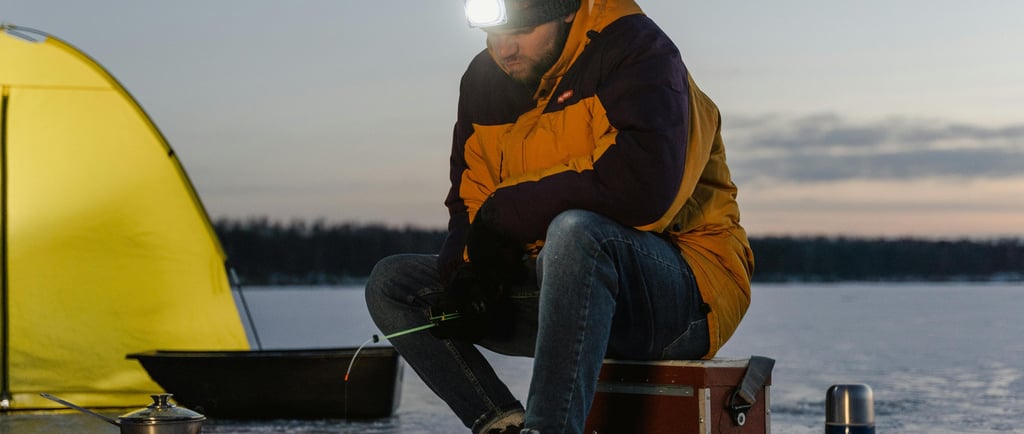Fishing with Improvised Tools
FOOD SURVIVAL


Why Fishing Matters in Survival
Fish are one of the most reliable food sources in many survival settings. They provide protein, fats, and vital nutrients that plants alone cannot supply. While a modern fishing rod makes the task easier, it is not always available when disaster strikes. Knowing how to improvise fishing tools from what you have around you allows you to turn rivers, lakes, and even coastal waters into food sources.
Simple Hand Lines
The most basic improvised fishing tool is a hand line. All you need is a length of cord, string, or even shoelaces. Tie on a hook, or create one from bent metal such as a safety pin, paperclip, or nail. Add bait like worms, insects, or scraps of food, and drop the line into the water. Hand lines are simple, discreet, and easy to carry, making them ideal for both wilderness and urban survival.
Hooks from Everyday Materials
Hooks are often the hardest part to improvise, but they can be crafted from many materials. Bone fragments, thorns, or sharpened wood can be carved into points. For stronger hooks, bend and sharpen pieces of wire, paperclips, or soda can tabs. Even small nails can be shaped into hooks with some effort. The goal is to create a curved, sharp point that can catch and hold a fish’s mouth.
Nets and Traps
When you need a more passive method, nets and traps can do the work for you. Nets can be woven from strips of clothing, plant fibers, or even plastic bags tied together. Fish traps are often made by arranging stones into a funnel shape in shallow water, guiding fish into a narrow space they cannot escape. Basket-style traps can be made from woven branches, reeds, or wire mesh if available. These methods require more effort up front but can catch food while you focus on other survival tasks.
Spears and Harpoons
In shallow water, a spear or harpoon can be very effective. A strong stick sharpened to a point works, but splitting the tip into prongs and securing them with cordage improves your chance of success. Metal scraps can also be fastened to the end of a stick to create a stronger point. Spear fishing requires patience and practice, as water bends light and makes fish appear farther away than they are. Aim slightly below the fish to account for this.
Improvised Floats and Weights
To keep your line effective, floats and weights help position bait in the water. Small pieces of wood, cork, or even Styrofoam can act as floats. Stones tied to the line with cord or wrapped in fabric serve as weights. Adjusting these lets you target fish at different depths. These small details increase the chances of a successful catch.
Using the Environment to Your Advantage
Fish are creatures of habit, and understanding their behavior helps you catch them more easily. Look for shady areas, underwater logs, or places where insects land on the surface. Early morning and evening are often the best times to fish. In coastal areas, tidal pools can trap fish as the tide recedes, making them easy to gather without much effort.
Bait from Nature
Bait can be found almost anywhere. Worms, insects, and grubs are highly effective. In urban areas, scraps of food, bread, or even bits of shiny metal can attract fish. Some survivalists use plant material like corn or berries if nothing else is available. The key is to experiment with what the environment offers and watch what the fish respond to.
Passive vs. Active Fishing
Hand lines and spears require constant attention, while traps and nets allow you to set them and check later. A balanced strategy is best. Use active methods when you have time and energy, but also set traps so that food can be caught while you are working on shelter or fire. This way, you maximize your return with minimal wasted effort.
Keeping and Cooking the Catch
Once you have fish, they must be handled safely. Clean them as soon as possible by removing guts and washing in clean water. Fish can be cooked on hot stones, skewered over a fire, or smoked to preserve them longer. Even small catches are valuable, since they provide protein and energy when other food sources are scarce.
Fishing as Survival Security
Improvised fishing may not always be efficient, but even one successful catch can keep you alive for another day. The ability to create tools from scraps, sharpen a branch into a spear, or weave a net from clothing transforms an empty shoreline into a potential feast. Fishing is not just about skill, it is about patience, creativity, and persistence. In survival, those qualities often matter as much as the tools themselves.